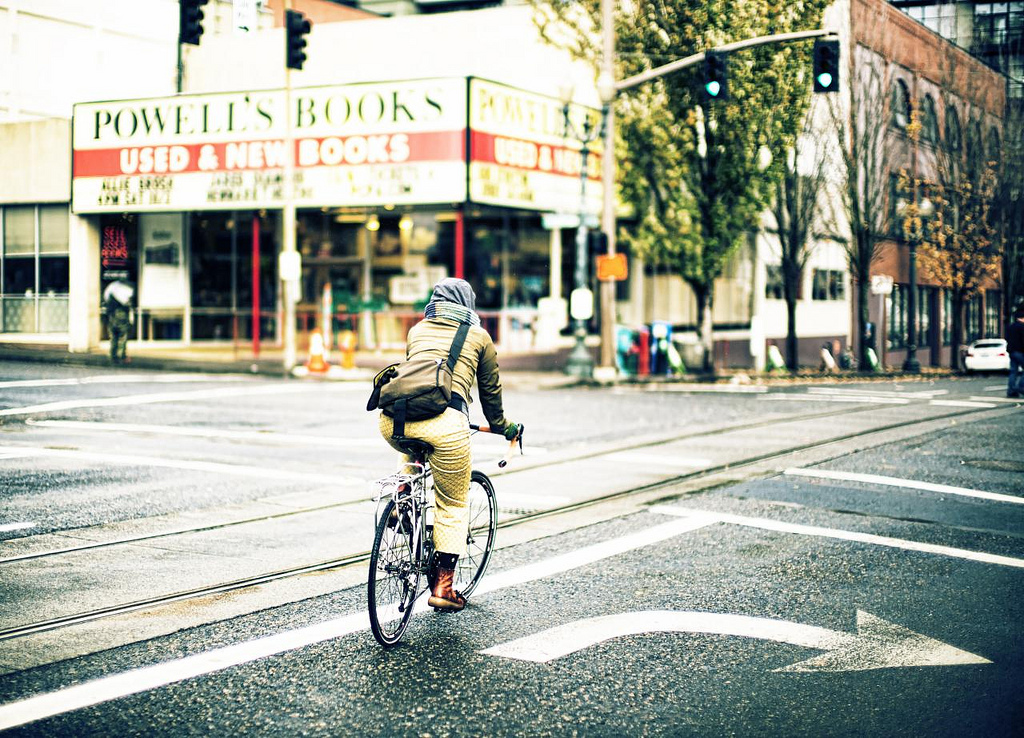
Knight study tour explores walkable, bikeable Portland, Ore.
Photo (above) by Flickr user Christopher Michael.
At Knight Foundation, we know that the dream of the ’90s is alive in Portland. But it’s not the only thing; a robust and thriving public life has become one of the city’s key trademarks.
That’s no accident, says Carol Coletta, Knight’s vice president for community and national initiatives. In fact, the emphasis on making public life more compelling was “part of a conscious decision by city leadership to turn its formerly opaque government into something completely different.”
An upcoming study tour of Portland, May 4-5, organized by 8-80s Cities and funded by Knight, will give city and economic development leaders and entrepreneurs from Akron, Ohio; Charlotte, N.C.; Detroit; Macon, Ga.; San Jose, Calif.; Columbus, Ga.; and Wichita, Kan., the opportunity to learn how the city developed a strong sense of public life. Several members of Knight’s Community and National Initiatives Program also plan to join the tour, including Carol Coletta, Benjamin de la Peña, George Abbot, Daniel Harris, Beverly Blake, Katy Locker, Susan Patterson and Kyle Kutuchief.
Specifically, the tour will explore how Portland’s leaders consciously chose to revamp public space and civic life. According to Coletta, they realized that if they were “going to get people really engaged in the life of the city and make public life more compelling, they needed to lure residents out of their living rooms and into public life.” So the city rescinded outdated ordinances prohibiting things like sidewalk cafes and music in the park.
Participants will understand how these changes, set amid the backdrop of a community that decisively fought to keep a large eight-lane freeway out of its neighborhoods, set the stage for a uniquely vibrant, walkable and bikeable city.
Through conversations, workshops and walking tours led by Ethan Seltzer, a professor at Portland State University, and Joe Cortright, president and principal economist at Impresa Consulting, the tour will shed light on how local business clusters are linked by a “do-it-yourself” ethic and maker economy.
Small-scale local entrepreneurs play a key role in tapping into and enlivening Portland’s neighborhood business districts, says Cortright. “From creating everything from food carts and grocery stores to bike shops, music venues and even a tiny house hotel,” this trip will explore the “processes and policies that have enabled [those entrepreneurs] to flourish. That can provide insights to other communities looking to tap into their own unique entrepreneurial opportunities.”

Portland, Ore. Photo by Flickr user Thomas Hawk. Participants will also experience the sharing, the ease and the spirit of independence in Portland, says Coletta. “Those elements aren’t confined to one or two ‘cool’ neighborhoods, but to numerous ones throughout the city.” The diversity and spirit of sharing has been “accelerated by the fact that the city pays such great attention to its streets.”
Participants will also have the opportunity to meet with local business owners, advocates and community leaders. Portland is a city that “enables people to act out their passions by creating local and thriving businesses,” says Coletta. These two days will allow people to witness how that spirit of entrepreneurship is a “means to making its streets more vibrant and its city more compelling to retain local talent.”
The tour will culminate with an interactive workshop on Tuesday afternoon exploring how other cities can support their own thriving small businesses and create more vibrant and robust public spaces.
We’ll be capturing insights and lessons learned from the tour over the next week and sharing them here on KnightBlog. You can also follow the tour via @knightfdn and the #knightcities hashtag starting Monday morning.
Elizabeth Miller Tilis is a digital communications consultant based in Kansas City, Mo.
Recent Content
-
Community Impactarticle ·
-
Community Impactarticle ·
-
Community Impactarticle ·


